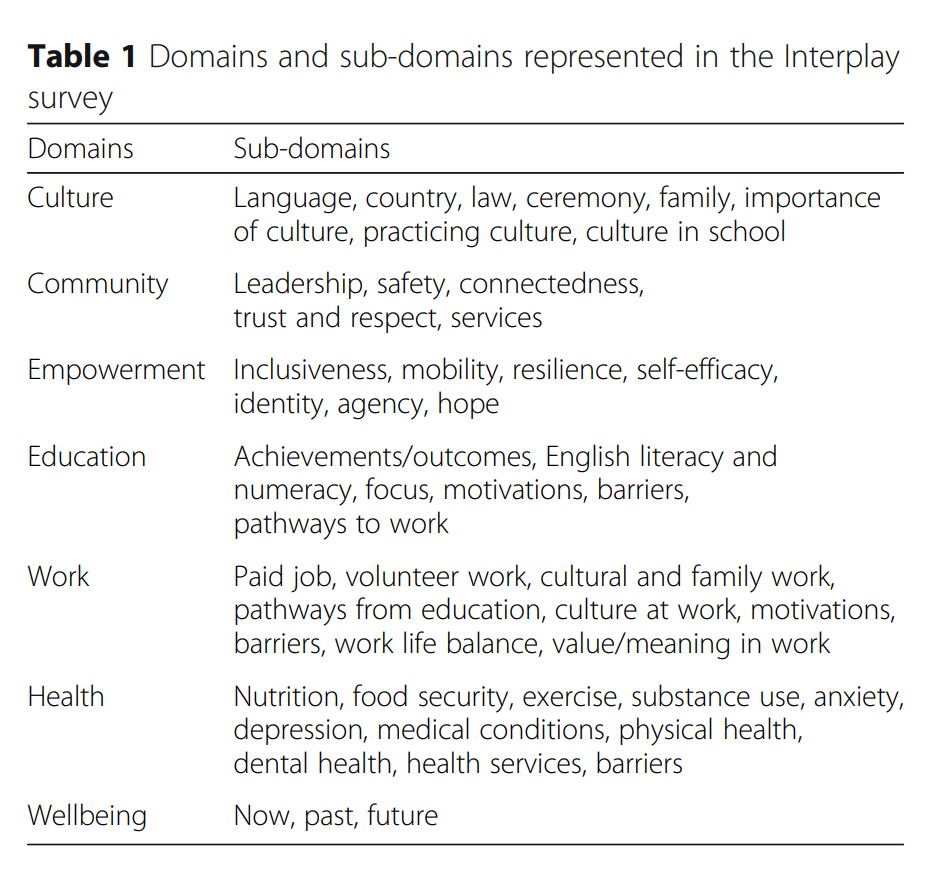A while ago I stumbled on some work by the Interplay Project addressing wellbeing in remote communities. It has come to mind more recently as we begin to explore how to strengthen the dementia friendliness of the art centre. While there are several dementia friendly guides and principles including rights based approaches, a sense of wellbeing also needs to underpin this work. Wellbeing is complex and means more than wellness. In another project I am working in currently examining thriving in vertical schools, the researchers propose that wellbeing is strongly related to capabilities (as per the work of Nussbaum and Sen). Given the different lenses and perspectives, wellbeing is contestable and needs to be addressed on the basis of experience. In many appraisals of wellbeing, it is understood as an anthropocentric idea or ideal, rather than one that is more deeply connected to more than human systems.
As a research consultancy, the Interplay Project is led by highly experienced researchers and cultural practitioners. In a paper titled ‘Interplay wellbeing framework: a collaborative methodology ‘bringing
together stories and numbers to quantify Aboriginal cultural values in remote Australia’ (Cairney et al, 2017), the development of the wellbeing framework is explained as a response to universal wellbeing measures and governance structure that marginalise and omit Aboriginal people living in remote communities. This cultural bias has multiple impacts on Aboriginal people and communities:
A cultural bias or cultural dependence is created when national policy and measures of success represent a majority, and in doing so, exclude the needs and values of diverse cultural groups. In Australia, this has been challenged as a ‘deficit’ approach based on its underlying assumption that Aboriginal people will experience a better quality of life if they adopt mainstream values and practices, and are considered to ‘fail’ when they do not.
Cairney et al. International Journal for Equity in Health (2017) 16:68
The Interplay Wellbeing Framework was developed through a highly collaborative and participatory approach in which users were participant researchers and which is described as ‘shared space’. Through this project the wellbeing framework draws identifies six priorities of education, employment, health, culture, empowerment and community. The first three of these are drawn from national Closing the Gap priorities and the remainder were identified by communities. In the validation research, these were further clarified in a survey and understood as below.

Through their analysis the researchers statistically confirmed:
the holistic nature of wellbeing for Aboriginal people in remote Australia, and the importance of culture, empowerment and community to government priority areas of education, work, health and wellbeing. The evidence reported here demonstrates that all of these factors interplay through both direct and indirect relationships. They all interrelate – they all influence one another and exist as one entity. This suggests that governments can ‘close the gap’ on their priority areas of education, employment, health and wellbeing through policy and programs that build from the Aboriginal priority areas of culture, empowerment and community, such as the Empowered Communities program.
This consideration of wellbeing is vital in addressing dementia friendly communities – wellbeing is dynamic and relational. The research findings stress a significant role for culture, community and empowerment in wellbeing – and these are potentially even more important for people living with dementia. While dementia friendliness can be an approach to wellbeing, dementia friendly approaches also need to be informed by a more culturally connected and holistic understanding of wellbeing. The early post presenting research on ‘elder-centred care’ is based on and reflects Alaska Native experiences and perspectives. While the salutogenic framework makes many important contributions to understanding wellbeing and sense of coherence, it is difficult to understand its cultural relevance. The Interplay framework has been developed and validated in collaboration with Aboriginal people. During the week’s activities at the art centre, informal observations relayed by John indicate that elders living with cognitive decline are more at ease when engaged in culture and with community. This enhances empowerment through expressions of identity, even when self-efficacy is challenged by the encroachment of the disease.
Posted on 23/06/2023
0